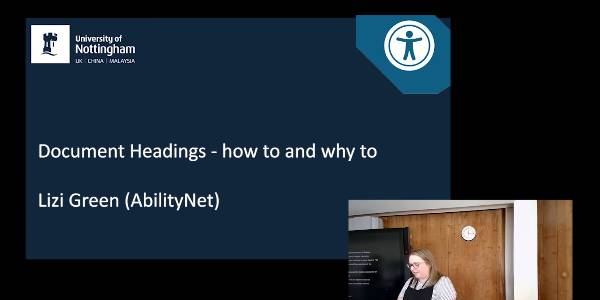
August 2, 2023, by Ben Atkinson
The Digital Accessibility Conference: Sessions Review Part 1
On the 29th of June 2023, Learning Technology hosted a Digital Accessibility Conference at the University of Nottingham. In this series of blog posts, we are reflecting on the conference and sharing reviews written by members of the team who chaired panels during the 2023 conference. In this post, Dave Corbett reflects on the lightening talks and short papers in sessions 2B and 4D.
Session 2B: Lightening Talks
Presenters: Lizi Green (AbilityNet), Micheál Ó Cadhain (University of Galway), Ana Castellano-Beltrán (The Open University), Aurèlia Puigdomènech (KCL), Tharindu Liyanagunawardena (University of Reading), Mark Corquodale (University of Nottingham) & Gavin Innes, (University of Aberdeen)
It was a pleasure to chair the Lightning Talks session where there were 8 brilliant presenters. The challenge was whether they could share something significant in under five minutes.
First up was Lizi Green from AbilityNet who focused on the practicalities of implementing headings into a document. Micheál Ó Cadhain shared how the University of Galway tackled staff training around digital accessibility, and talked about how the practical application of correcting an inaccessible document helped this knowledge to stick. Ana Castellano-Beltrán from the University of Seville shared how a chatbot had been developed to improve accessibility within an individual subject. Aurèlia Puigdomènech from King’s College London unpacked 4 issues with PDFs and how we can move beyond their use in an engaging talk.
At the halfway point, things were remarkably running to time and the prospect of being late to lunch was diminishing.
Tharindu Liyanagunawardena from the University of Reading was warmly received as she showcased their ‘Look Again’ programme which improved the student experience by acting on lived experiences and feedback. University of Nottingham’s very own Mark McCorquodale, shared a project that the Faculty of Engineering had run by improving the accessibility of resources in mathematical disciplines and how they are using HTML more to display equations.
One of the things that really impressed with me was the ‘My Computer, My Way’ tool presented by Lizi Green (back for a second round). This can be found on the AbilityNet website and explains the optimum settings for a device based on a variety of needs. It is a really impressive is something that would be great to share with students early on in their University life. Gavin Innes from the University of Aberdeen rounded things off nicely with an insight into their accessibility journey and where they are taking things next.
It was a thoroughly enjoyable session and with the nature of the talks being very fast paced, I will be scheduling some time out to view the recording. Everyone who presented did really well. I also did really well in less inspiring ways by holding up a screen with problematic height adjustment for the best part of 40 minutes and before you ask, we did make lunch on time!
Session 4D/1: Moodle templates as a trojan horse for UDL
Presenter: Fred Bouilheres, University of Nottingham
Frederique Bouilheres kicked off session 4D in the afternoon where she unpacked how the Faculty of Social Sciences improved the accessibility of their modules in Moodle by developing and implementing templates. Fred showed how the templates had been developed and used the principles of Universal Design for Learning (UDL) to give specific examples of how content could be presented. I am a big advocate for UDL and the way it is applicable synchronously and asynchronously so I thoroughly enjoyed the session. The inevitable but important question at the end was around compliance and what happened if staff didn’t make the necessary changes. I liked the response which was that staff needed to know that it was going to be something that wouldn’t change again soon after and that there was an element of future-proofing to the work. Also, the need for a large number of advocates was set out, particularly in spreading the positive benefits of the project.
Session 4D/2: Just don’t build the wall: focusing on building accessible content, rather than remediation.
Presenters: France Barth, Aurèlia Puigdomènech & Paul Warren (King’s College, London)
Three Presenters from King’s College London; France Barth, Aurèlia Puigdomènech and Paul Warren took to the floor to explain how they engage with academics staff at the early part of the design stage so that course content starts out being accessible, rather than it needing remedial work later. This was done through the ‘King’s Online Design System’. I was impressed with how they requested detailed information about their course including the different technologies used and that not everything gets approved straight away of there are accessibility issues. It was clear that institutional buy-in was important with that side of things. The example learning activities that they promote to staff were well thought out and showed evidence of inclusive practice as well as accessibility.
Overall, the two talks focussed on not just the technical elements of accessibility but also the pedagogical elements as well and are well worth catching up with if you haven’t already.
No comments yet, fill out a comment to be the first

Leave a Reply